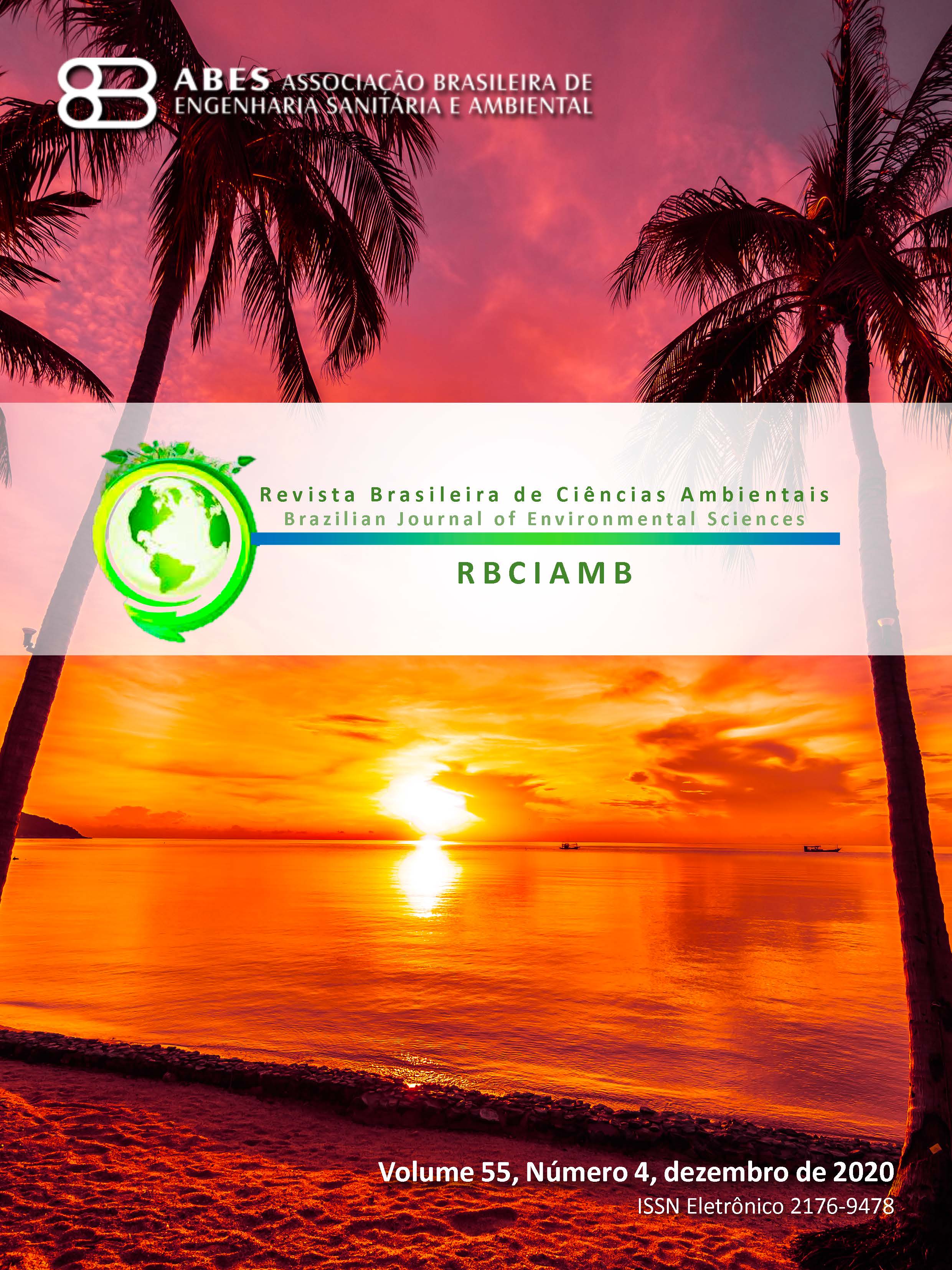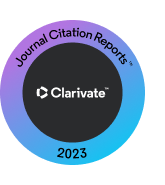IMPACT OF AIR POLLUTION ON PUBLIC HEALTH IN HIGH INDUSTRIALIZED MUNICIPALITIES IN THE STATE OF SÃO PAULO
DOI:
https://doi.org/10.5327/Z2176-947820200671Keywords:
industrial pollution; air pollution; health impact, economic valuation.Abstract
The State of Sao Paulo presents the highest industrialized area of Brazil, having the biggest GNP in the country. As a result of industrial activities, many municipalities have been presenting high levels of air pollution. The aim of this research was to estimate the cardiorespiratory mortality caused by air pollution in some high-industrialized cities of São Paulo State between 2008 and 2016. Eleven municipalities were selected based on the industrial electricity consumption and on the existence of at least one air pollution monitoring station. We used a World Health Organization model to estimate the number of deaths that could be attributed to PM2,5 in each municipality through the years. Based on the statistical value of a life, we performed an economic evaluation of health impacts. Five of the 11 municipalities belong to the São Paulo Metropolitan Region. The municipality most affected by air pollution was Cubatão. However, due to the large number of inhabitants, São Paulo is the municipality whose largest number of deaths can be attributed to exposure to PM pollutants. Considering the results found for the 11 municipalities, 43,512 deaths could be attributed to air pollution in the period, which represents a loss of more than US$ 48.3 billion. These results justify the need for additional research and the implementation of cleaner technologies in the industrial park of the state of São Paulo.
Downloads
References
AMERICAN PUBLIC HEALTH (APHA); AMERICAN WATER WORKS (AWWA); WATER POLLUTION CONTROL FEDERATION (WPCF). Standard Methods for the Examination of Water and Wastewater. 21. ed. Washington, D.C.: American Public Health/American Water Works, 2012.
ANTONY, A.; BASSENDEH, M.; RICHARDSON, D.; AQUILINA, S.; HODGKINSON, A.; LAW, I.; LESLIE, G. Diagnosis of dissolved organic matter removal by GAC treatment in biologically treated paper mill effluents using advanced organic characterisation techniques. Chemosphere, v. 86, n. 8, p. 829-836, 2012. https://doi.org/10.1016/j.chemosphere.2011.11.059
BOU, A.S.F.; PEREIRA, B.C.; SILVA, L.D.B.; FERREIRA, J.A.; CAMPOS, J.C.; NASCENTES, A.L. Remoção da cor no tratamento combinado de lixiviado de aterro sanitário e esgoto doméstico via processo PACT. Engenharia Sanitária e Ambiental, v. 23, n. 2, 2018. https://doi.org/10.1590/s1413-41522018150425
BRINK, A.; SHERIDAN, C.M.; HARDING, K.G. A kinetic study of a mesophilic aerobic moving bed biofilm reactor (MBBR) treating paper and pulp mill effluents: The impact of phenols on biodegradation rates. Journal of Water Process Engineering, v. 19, p. 35-41, 2017. https://doi.org/10.1016/j.jwpe.2017.07.003
CAMPOS, J.C.; MACHADO, C.R.A.; COUTO, J.M.S.; FLORIDO, P.L.; CERQUEIRA, A.C.F.P.; SANTIAGO, V.M.J. Evaluation of an Activated Sludge Process Combined with Powdered Activated Carbon for the Treatment of Oil Refinery Wastewater. Journal of International Environmental Application and Science, v. 9, n. 1, p. 24‑36, 2014.
CARSTEA, E.C.; BRIDGEMAN, J.; BAKER, A.; REYNOLDS, D.M. Fluorescence spectroscopy for wastewater monitoring: a review. Water Research, v. 95, p. 205-219, 2016. https://doi.org/10.1016/j.watres.2016.03.021
ÇEÇEN, F. The use of UV-VIS measurements in the determination of biological treatability of pulp bleaching effluents. In: INTERNATIONAL WATER ASSOCIATION SYMPOSIUM ON FOREST INDUSTRY WASTEWATERS, 7., 2003. Anais… Seattle, 2003.
CHAMORRO, S.; POZO, G.; JARPA, M.; HERNANDEZ, V.; BECERRA, J.; VIDAL, G. Monitoring endocrine activity in kraft mill effluents treated an Aerobic moving bed bioreactor system. Water Science and Technology, v. 62, n. 1, p. 154-161, 2010. https://doi.org/10.2166/wst.2010.297
CHEN, W.; WESTERHOFF, P.; LEENHEER, J.A.; BOOKSH, K. Fluorescence excitation–emission matrix regional integration to quantify spectra for dissolved organic matter. Environmental Science & Technology, v. 37, n. 24, p. 5701-5710, 2003. https://doi.org/10.1021/es034354c
FENG, Z.; CHEN, H.; LI, H.; YUAN, R.; WANG, F.; CHEN, Z.; ZHOU, B. Preparation, characterization, and application of magnetic activated carbon for treatment of biologically treated papermaking wastewater. Science of The Total Environment, v. 713, 2020. https://doi.org/10.1016/j.scitotenv.2019.136423
GEREMIAS, R.; LAUS, R.; FÁVERE, V.; PEDROSA, R. Adsorção de íons Cu (II), Mn (II), Zn (II) e Fe (III), utilizando rejeito de mineração de carvão como adsorvente. Revista Brasileira de Ciências Ambientais, n. 25, p. 48-59, 2012. Disponível em: <http://rbciamb.com.br/index.php/Publicacoes_RBCIAMB/article/view/316>. Acesso em: 20 maio 2020.
HINOJOSA, E. A. L.; XAVIER, C. R. Remoção de matéria orgânica e cor de efluente kraft por adsorção usando carvão ativado e argila. Hydro, p. 26-31, 2016. Disponível em < https://www.arandanet.com.br/assets/revistas/hydro/2016/novembro/index.php?>. Acesso em: 12 nov. 2019.
HUBBE, M.A.; METTS, J.R.; HERMOSILLA, D.; BLANCO, M.A.; YERUSHALMI, L.; HAGHIGHAT, F.; LINDHOLM-LEHTO, P.; KHODAPARAST, K.; KAMALI, M.; ELLIOTT, A. Wastewater Treatment and Reclamation: A Review of Pulp and Paper Industry Practices and Opportunities. Bioresources, v. 11, n. 3, p. 7953-8091, 2016. https://doi.org/10.15376/biores.11.3.Hubbe
INTERNATIONAL ORGANIZATION FOR STANDARDIZATION (ISO). ISO 9277: Determination of the specific surface area of solids by gas adsorption — BET method. International Organization for Standardization, 2010.
KAMALI, M.; ALAVI-BORAZJANI, S.A.; KHODAPARAST, Z.; KHALAJ, M.; JAHANSHAHI, A.; COSTA, E.; CAPELA, I. Additive and additive-free treatment technologies for pulp and paper mill effluents: Advances, challenges and opportunities. Water Resources and Industry, v. 21, 2019. https://doi.org/10.1016/j.wri.2019.100109
LUZ, A.D.; SOUZA, S.M.A.G.U.; LUZ, C.; REZENDE, R.V.P.; SOUZA, A.A.U. Multicomponent Adsorption and Desorption of BTX Compounds Using Coconut Shell Activated Carbon: Experiments, Mathematical Modeling, and Numerical Simulation. Industrial e Engineering Chemistry Research, v. 52, n. 23, p. 7896-7911, 2013. https://doi.org/10.1021/ie302849j
MACHADO, E.P.; XAVIER, C.R.; COUTO, G.H. Tratamento de efluente Kraft em lagoa aerada facultativa empregando enzimas lignolíticas. Interciência, v. 43, n. 8, p. 590-596, 2018.
MANAGÓ, B.L. Treatment of pulp wastewater by membrane bioreactor. 84f. Tese (Doutorado em Ciências Florestais) – Universidade Estadual do Centro-Oeste, Guarapuava, 2018.
MICHELETTO, J.; SAMPAIO, N.M.F.M.; RUIZ, H.Z.; MARTINS, L.R.R.; LIZ, M.V.; FREITAS, A.M. Acute ecotoxicity on Daphnia magna to evaluate effluent samples of Kraft pulp mill treated by UV/H2O2 process. Ambiente e Água, v. 14, n. 2, 2019. http://dx.doi.org/10.4136/ambi-agua.2208
MISHRA, S.B.; MISHRA, A.K.; KHAN, M.A. Decolourization of pulp and paper mill effluents using heat-treated coal: a comparison with activated charcoal. Environmental Chemistry Letters, v. 8, p. 231-235, 2010. https://doi.org/10.1007/s10311-009-0211-4
MUHAMAD, M.H.; ABDULLAH, S.R.S.; HASAN, H.A.; RAHIM, R.A. Comparison of the efficiencies of attached- versus suspended-growth SBR systems in the treatment of recycled paper mill wastewater. Journal of Environmental Management, v. 163, p. 115-124, 2015. https://doi.org/10.1016/j.jenvman.2015.08.012
ORREGO, R.; HEWITT, L.M.; MCMASTER, M.; CHIANG, G.; QUEIROZ, M.; MUNKITTRICK, K.; GAVILÁN, J.F.; BARRA, R. Assessing wild fish exposure to ligands for sex steroid receptors from pulp and paper mill effluents in the Biobio River Basin, Central Chile. Ecotoxicology and Environmental Safety, v. 171, p. 256-263, 2019. https://doi.org/10.1016/j.ecoenv.2018.12.092
OSMAN, W. H. W.; ABDULLAH, S. R. S.; MOHAMAD, A. B.; KADHUM, A. A. H.; RAHMAN, R. A. Simultaneous AOX and COD removal from wastewater from recycled paper using real GAC-SBBR. Journal of Environmental Management. v. 121, p. 80-86, 2013. https://doi.org/10.1016/j.jenvman.2013.02.005
PEITZ, C.; XAVIER, C.R. Evaluation of aerated lagoon modified with spongy support medium treating Kraft pulp mill effluent. Revista Facultad de Ingeniería, v. 92, p. 70-79, 2019. http://dx.doi.org/10.17533/udea.redin.20190725
PEITZ, C.; XAVIER, C.R. Tratamento de efluente kraft contendo fitoesteróis por reator de leito móvel MBBR. Interciência, v. 42, n. 8, p. 536-541, 2017. Disponível em: <http://www.redalyc.org/articulo.oa?id=33952871009>. Acesso em: 25 nov. 2019.
SOLER, C.; XAVIER, C.R. Tratamento de efluente de indústria têxtil por reator biológico com leito móvel. Revista Brasileira de Ciências Ambientais (RBCIAMB) , n. 38, p. 21-30, 2015. https://doi.org/10.5327/Z2176-947820155714
VANZETTO, S.C.; KLENK, M.; ROSA, S.M.C.; XAVIER, C.R. Tratamento de efluente de indústria de papel e celulose por reator MBBR. Hydro, v. 89, p. 42-45, 2014. Disponível em: <https://www.researchgate.net/publication/330090754>. Acesso em: 27 nov. 2019.
VON SPERLING, M. Lodos ativados: princípios do tratamento biológico de águas residuárias. 3. ed. Belo Horizonte: Editora UFMG, 2016.
XAVIER, R.; TRAGHETTA, D.; OLIVEIRA, C. Avaliação da eficiência de um reator de carvão ativado impregnado com prata no tratamento de águas residuárias geradas em laboratórios de análises clínicas. Revista Brasileira de Ciências Ambientais, n. 15, p. 29-38, 2010. Disponível em: <http://rbciamb.com.br/index.php/Publicacoes_RBCIAMB/article/view/393>. Acesso em: 20 maio 2020.
WANG, D.; HU, Q.; LI, M.; WANG, C.; JI, M. Evaluating the removal of organic fraction of commingled chemical industrial wastewater by activated sludge process augmented with powdered activated carbon. Arabian Journal of Chemistry, v. 9, supl. 2, p. S1951-S1961, 2016. https://doi.org/10.1016/j.arabjc.2015.08.031
YU, Z.; HU, Y.; DZAKPASU, M.; WANG, X.C.; NGO, H.H. Dynamic membrane bioreactor performance enhancement by powdered activated carbon addition: Evaluation of sludge morphological, aggregative and microbial properties. Journal of Environmental Sciences, v. 75, p. 73-83, 2019. https://doi.org/10.1016/j.jes.2018.03.003
Downloads
Published
How to Cite
Issue
Section
License
Copyright (c) 2020 Revista Brasileira de Ciências Ambientais

This work is licensed under a Creative Commons Attribution 4.0 International License.


























